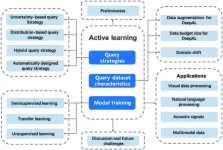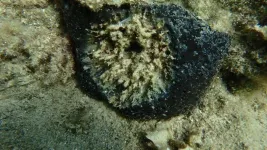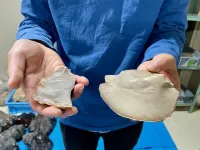(Press-News.org)
New York, NY —The American Federation for Aging Research (AFAR), is pleased to announce a $16 million expansion of the Hevolution-AFAR New Investigator Awards in Aging Biology and Geroscience Research,
a grant program to enable early-career investigators with labs in the US and Canada to research healthspan-expanding therapeutics and treatments. Hevolution Foundation, a non-profit organization that provides grants and early-stage investments to incentivize research and entrepreneurship in healthspan science, has awarded the
AFAR $16 million to expand the program.
AFAR and the Hevolution Foundation launched the New Investigator Awards in 2022 as a pilot initiative to support research projects in the basic biology of aging or geroscience—a research paradigm based on addressing the biology of aging and age-related diseases to promote healthy aging. In its first cycle, the program generated strong interest in the global aging research community and funded 18 research projects, spanning topics such as cellular senescence, compounds such as metformin and rapamycin, and translational topics such as data-guided drug discovery.
Given the enthusiastic reception from the scientific community and the high quality of the investigators and their research, Hevolution is expanding this program with an additional commitment of $16 million to continue their partnership with AFAR. The funding will provide support in 2023 and 2024 for up to 36 investigators in Canada and the United States with three-year awards of $375,000 each.
"The Hevolution-AFAR New Investigator Awards in Aging Biology and Geroscience are vital to support the next generation of geroscience and aging biology researchers. Nurturing this young talent is crucial for the future advancement of novel gerotherapeutics to extend healthspan in line with our mission to provide grants and early-stage investments to incentivize independent research in the emerging field of healthspan science," states Felipe Sierra, PhD, Chief Scientific Officer, Hevolution Foundation.
The New Investigator Awards are selected through AFAR's vigorous review process led by a committee of accomplished scientists representing a wide range of expertise in biomedical research on aging. The New Investigator Awards selection committee is chaired by Gordon Lithgow, PhD, Professor at the Buck Institute for Research on Aging, who notes: "The New Investigator Awards meet a need in the field to better support early career investigators while addressing the unique impact of the biology of aging on the biology of age-related diseases."
Stephanie Lederman, EdM, Executive Director of AFAR shares: "Hevolution Foundation is providing much needed resources in order to build the human capital necessary to drive and advance the field. The unique approaches of the selected awardees will influence the future of healthspan research that is working to help us all live healthier, longer."
For more information on the Hevolution-AFAR New Investigator Awards in Aging Biology and Geroscience and all AFAR grant programs, please visit http://www.afar.org/funding-opportunities. Explore more perspectives from many of the inaugural New Investigators in AFAR’s Grantee Spotlight Interviews here.
AFAR anticipates announcing the 2023 New Investigators in early 2024.
###
About AFAR
The American Federation for Aging Research (AFAR) is a national non-profit organization that supports and advances pioneering biomedical research that is revolutionizing how we live healthier and longer. For more than four decades, AFAR has served as the field’s talent incubator, providing nearly $200 million to some 4,400 investigators at premier research institutions to date—and growing. In 2023, AFAR expects to provide approximately $12,500,000 to more than 60 investigators. A trusted leader and strategist, AFAR also works with public and private funders to steer high quality grant programs and interdisciplinary research networks. AFAR-funded researchers are finding that modifying basic cellular processes can delay—or even prevent—many chronic diseases, often at the same time. They are discovering that it is never too late—or too early—to improve health. This groundbreaking science is paving the way for innovative new therapies that promise to improve and extend our quality of life—at any age. Learn more at afar.org.
About Hevolution Foundation
Founded on the belief that every person has the right to live a longer, healthier life, Hevolution Foundation is a global catalyst, partner, and convener on a mission to drive efforts to extend healthy human lifespan and understand the processes of aging. With a focus on aging as a treatable process, Hevolution Foundation aims to increase the number of aging-related treatments on the market, compress the timeline of drug development, and increase accessibility to therapeutics that extend healthy lifespan, also known as healthspan. A global non-profit organization headquartered in Riyadh with a North American hub and an annual budget of up to $1 billion, Hevolution Foundation plans to open offices in other global locations to support a cutting-edge, global ecosystem of talent to propel aging and geroscience research forward and achieve medical breakthroughs to help humanity live healthier, longer. Connect with Hevolution Foundation on LinkedIn, X (formerly Twitter), and at hevolution.com
END
A Chinese research team wrote a review article on deep active learning, an increasingly popular method of combining active learning with deep learning for sample selection in the training of neural networks for artificial intelligence tasks. It was published Nov. 30 in Intelligent Computing, a Science Partner Journal.
Given that research on deep active learning techniques in the context of foundation models is limited, this review offers some insights into this topic. It surveys existing deep active learning approaches, applications and especially challenges "in the era of foundation ...
Tsukuba, Japan—Forests, known as nature's "green dams," play a crucial role in replenishing Earth's groundwater reserves. However, overcrowding in planted forests due to lack of maintenance activities, such as thinning practices, is a pressing concern in Japan. This overcrowding causes substantial water loss from these forests into the atmosphere through a combination of soil evaporation and tree transpiration (Et) known as evapotranspiration. In the rich forests of Japan, Et is a major factor in the depletion of water resources. Therefore, accurately measuring Et across wide areas is currently a critical task because ...
About The Study: Among 170 patients primarily with COVID-19–related severe acute respiratory distress syndrome (ARDS) supported by venovenous extracorporeal membrane oxygenation (VV-ECMO), prone positioning compared with supine positioning did not significantly reduce time to successful weaning of ECMO.
Authors: Matthieu Schmidt, M.D., of the Sorbonne Université in Paris, is the corresponding author.
To access the embargoed study: Visit our For The Media website at ...
As the use of wearable technology grows, smart watches are marketed across the globe to consumers as a way to monitor health.
For some, they’re told by these devices that they have atrial fibrillation, an irregular heartbeat, which is known to increase the risk of heart attack and stroke.
“Unfortunately, this has led to a tsunami of healthy patients coming to clinics complaining about having atrial fibrillation, and we see many false positives without really having a way to use these devices clinically,” said Hamid ...
PRESS RELEASE FROM THE UNIVERSITY OF CAMBRIDGE
EMBARGOED UNTIL 10 AM LONDON TIME (GMT) ON FRIDAY 1 DECEMBER 2023
Images and paper available at: https://drive.google.com/drive/folders/1JRhAD1ESL6NZN7acEoZQcXCA9w50Gczr?usp=drive_link
Phonetic information – the smallest sound elements of speech – may not be the basis of language learning in babies as previously thought
Babies don’t begin to process phonetic information reliably until seven months old – which researchers say is too late to form the foundation of language
Instead, babies learn from rhythmic information – the changing emphasis of syllables in speech – which unlike phonetic ...
The scorching heatwaves of 2023's summer and autumn shook the world, raising a pertinent question: Will this lead into the warmest winter the globe has ever witnessed?
After a summer and autumn marked by extreme temperatures and a consistent global warming trend across oceans and landmasses, concerns mounted about what might follow. The global average temperature during June to October 2023 surpassed the 1991-2020 average by 0.57℃. August and September soared even higher, surpassing historical averages by 0.62℃ and 0.69℃, respectively, eclipsing the records set in 2016.
From hottest ...
Vibrio bacteria, named for their vibrating swimming motion, span approximately 150 known species. Most Vibrio live in brackish or salt water, either swimming free or living as pathogens or symbionts in fish, crustaceans, molluscs, and corals. Because Vibrio thrive at relatively high temperatures, outbreaks in marine animals are expected to become ever more frequent under global warming. For example, over the past few decades, Vibrio have been implicated in the ‘bleaching’ of subtropical and tropical corals around the world.
Now, researchers from Spain and Turkey have shown that Vibrio bacteria also play a role in outbreaks of mortality of an unrelated ...
BOSTON – Individuals can improve their brain care and reduce their risk of developing brain diseases such as dementia and stroke by focusing on a list of 12 steps covering modifiable physical, lifestyle, and social-emotional components of health.
The list was developed and validated in research published in Frontiers in Neurology by investigators from the McCance Center for Brain Health at Massachusetts General Hospital (MGH) and their collaborators in the United States and Europe.
For the study, the scientists ...
Obesity is a major risk factor for cardiovascular metabolic diseases and neurodegenerative diseases such as dementia. Long-term exercise improves memory and spatial cognition, reduces age-related cognitive decline, and maintains brain volume, but the mechanisms are not fully understood.
Recently, a study from Febbraio lab at Monash University reported that voluntary exercise training (VET) improves long-term memory in high-fat diet (HFD)-induced obese mice, increases hippocampal neurogenesis ...
A research group led by the Nagoya University Museum and Graduate School of Environmental Studies in Japan has clarified differences in the physical characteristics of rocks used by early humans during the Paleolithic. They found that humans selected rock for a variety of reasons and not just because of how easy it was to break off. This suggests that early humans had the technical skill to discern the best rock for the tool. The researchers published the results in the Journal of Paleolithic Archaeology.
As Homo sapiens moved from Africa to Eurasia, they used stone tools made of rocks, such as obsidian and flint, to cut, slice, and craft ranged weapons. Because ...






